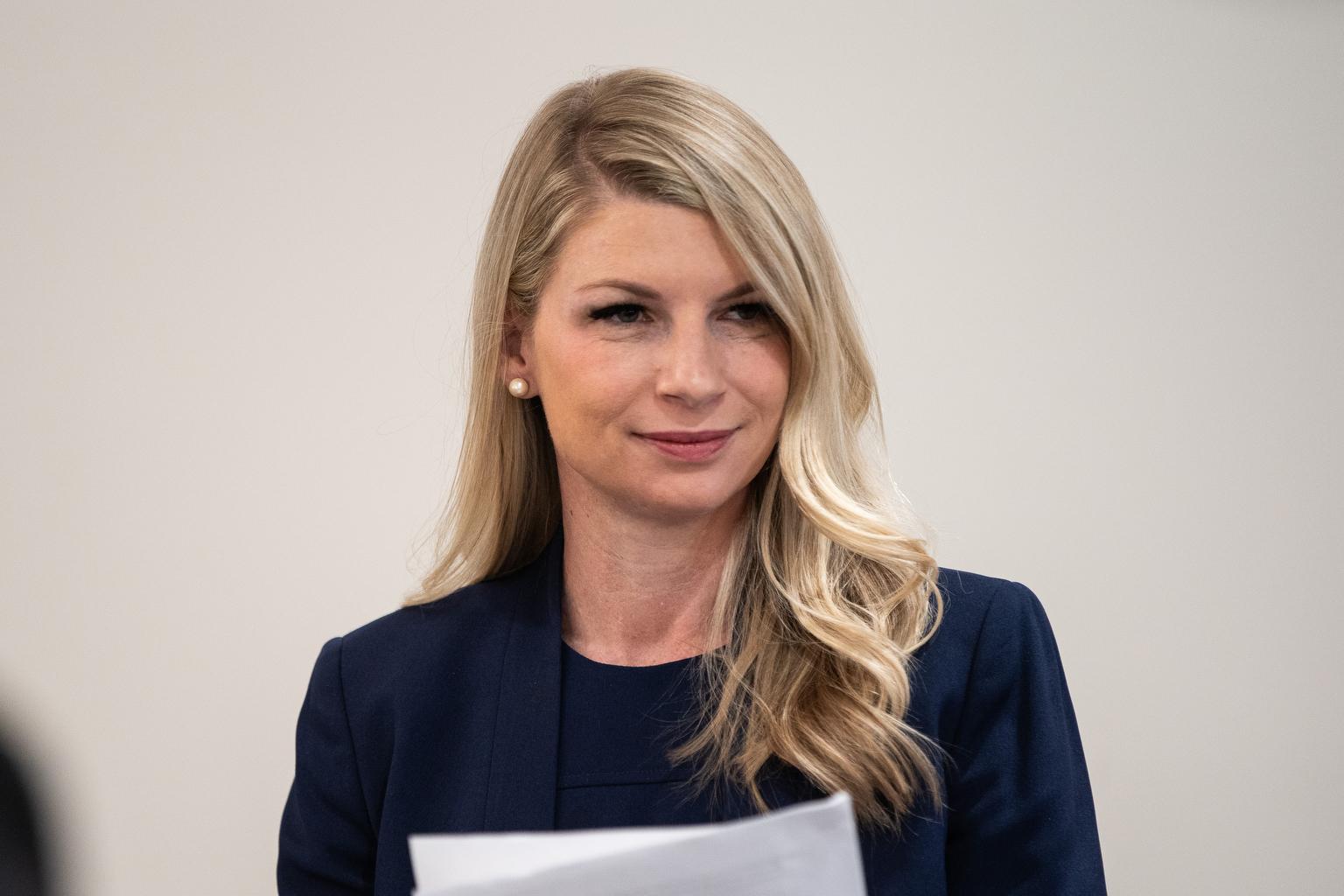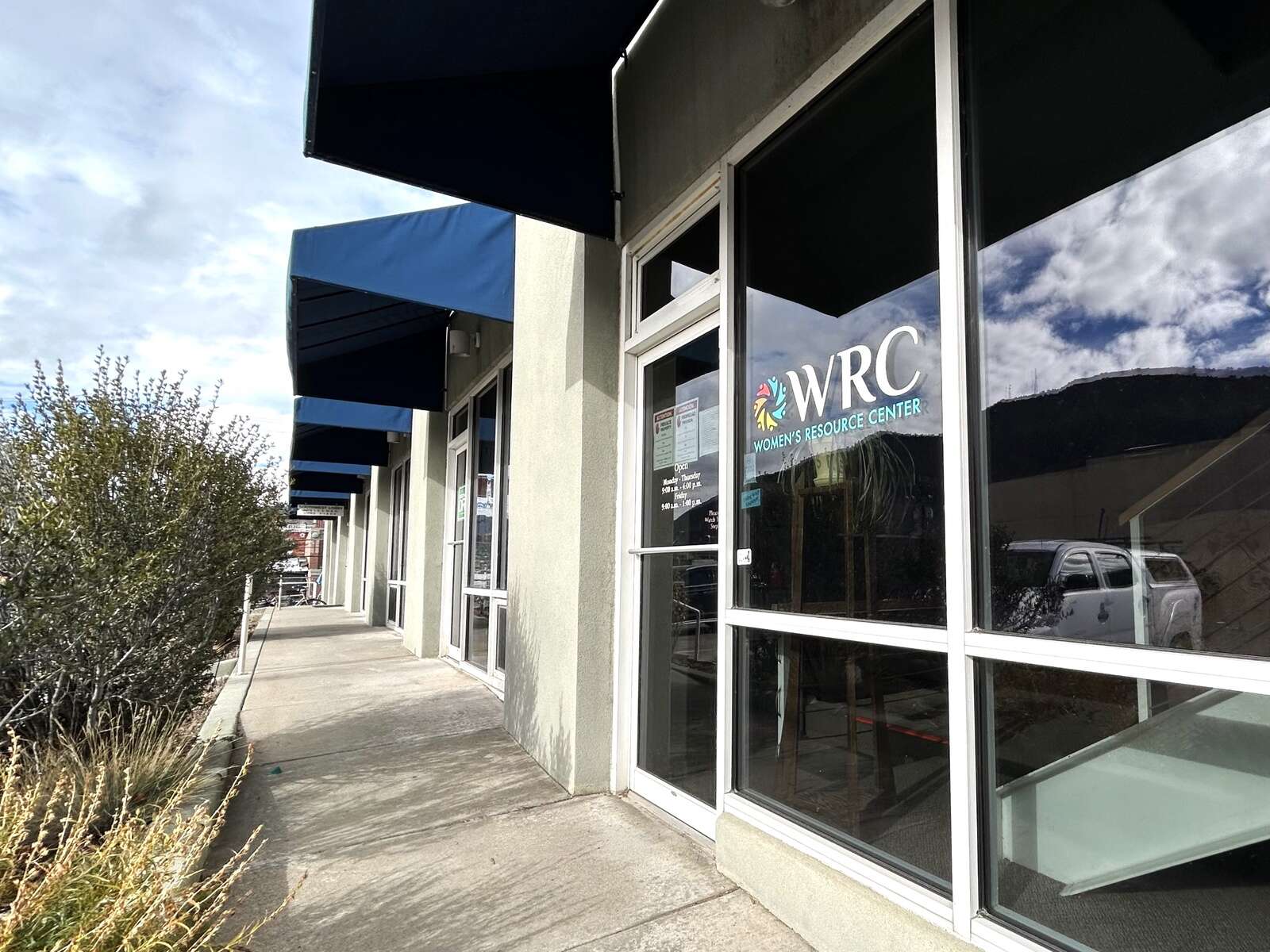
Democratic Rep. Brittany Pettersen is running for her second term in the 7th Congressional District.
She serves on the House Financial Services Committee and sits on two subcommittees, one on national security, illicit finance and international financial institutions, the other on housing and insurance.
She was the first House member from Colorado to call for President Joe Biden to drop his bid for re-election in July, saying it was necessary to defeat former president Donald Trump. Her bipartisan legislation to prevent the financing of illegal synthetic drugs passed the House of Representatives in May of 2023.
Much of Pettersen’s legislative work has focused on drug trafficking and addiction treatment, issues she’s familiar with from her mother’s struggles with substance use disorder. Pettersen, who is expecting her second child, has also pushed to make serving in congress easier for new parents.
Petterson served three terms as a representative at the state House before being elected to the state Senate in 2018. She was one of five Democratic women who won the chamber's most contested races that year; the so-called “Fab Five”, who helped flip control to their party.
CPR News is part of Voter Voices, a statewide effort to ask Coloradans what issues matter most to them in this election. We used those responses to develop the questionnaire CPR sent to major party candidates. Archuleta’s answers are below.
Brittany Pettersen on the economy and cost of living
What would you do, as a member of Congress, to address the cost of housing?
Addressing our housing crisis is one of my top priorities in Congress, and I’m honored to be on the Housing Subcommittee of the House Financial Services Committee. The lack of housing supply is impacting communities across the US, especially here in Colorado. We have seen a record number of people moving to our state for years which has put a huge strain on access to housing, and it has impacted our rural communities even more acutely after the pandemic with remote work opportunities. We need a majority in the House that will prioritize the bills that will invest in attainable housing, bring tax credits for developers to build the types of housing we need, incentivize local municipalities to streamline the local permitting process and get rid of outdated and restrictive land use policies. In addition, modernizing our immigration system to address our workforce shortage in all high-need areas is critical to increasing capacity and reducing rising costs.
We also need incentives for senior housing so our seniors can downsize and free up their current homes for the next generation. Additionally, we need to support homeownership through down payment assistance for first-time homeowners to help bring long-term financial security.
What can Congress do to address inflation, particularly around the cost of food?
The American economy had one of the quickest and strongest recoveries in the world following the COVID-19 pandemic, but the cost of everyday items has continued to weigh on families in Colorado and across the country. I’m working hard to lower costs across the board, from prescription drugs to child care, to groceries and gas.
The cost of groceries has come down recently, but large retailers have kept prices high to secure profits. Some grocers have passed these savings on to consumers, but others have not. I’m committed to holding these companies accountable for price gouging and would support a federal ban on price gouging on food and groceries.
We need a fair tax system that doesn’t create more billionaires and millionaires and invests back in the American people and our future, including affordable child care, health care, housing, higher education, and apprenticeship programs. Giving tax cuts to the most wealthy on the back of the middle class has continued to exacerbate the wealth and opportunity gap.
We must also restore and expand the Child Tax Credit to help families pay for everyday items and reduce the rate of childhood poverty nationwide.
What are your views on raising tariffs on foreign goods?
Increasing tariffs on foreign goods means that prices will go up for consumers. It is important to make sure some countries are not taking advantage of these tariffs in order to unfairly compete with American companies, but we need to focus on a fair, open, accountable, and competitive market to continue to lower the costs of goods and increase the supply of critical needs.
In my first term, I’ve been looking at tariffs and their impact on consumers. We’ve all heard of the ‘pink tax,’ where women’s products cost more than comparable products for men. But we haven’t begun to look at how our tariff system is playing a role in the different prices people pay because of their gender.
I introduced the Pink Tariffs Study Act, which requires the U.S. Treasury to report to Congress on potential gender bias within the U.S. tariff system. Tariffs on consumer goods are almost entirely passed onto working families, and gender bias in our tariff system would result in higher prices for women on their everyday essentials. I believe it’s important to look at our tariff system comprehensively and how it affects everyday costs for Americans.
Brittany Pettersen on democracy and good governance
What are your top three ideas for reforms to make Congress work better?
I believe expanded voting rights ensure that the folks we elect to Congress are truly representative of the people who elected them, which is why I proudly co- sponsored the John R. Lewis Voting Rights Advancement Act in my first term. If re-elected, I vow to co-sponsor it again in the 119th Congress. I will always oppose any attempt by Republicans to introduce arbitrary laws intended to restrict access to our constitutional right to vote.
The rule of law is foundational to our democracy and everyone — even a former president — should be held accountable if they break the law. To that end, I believe we need stronger enforcement of Congressional subpoenas and more robust protections for whistleblowers, in order to ensure that Congress can effectively hold the executive branch accountable.
Big money in politics is one of the greatest threats to American democracy. I support reforms to reduce private influence on politics, which would include the overturning of Citizens United and creating more options for public financing for candidates running for office.
If control of the federal government remains divided between the parties after the election, how do you plan to be effective for your district?
I am proud of my consistent track record of reaching across the aisle to deliver results for CD-7 and Colorado. Since day one, I have worked with my colleagues to pass legislation and get things done. Throughout my first term in Congress, the Republican party has been in control of the House but I was still able to secure almost $14 million in federal funds for community projects across the district. These projects range from adding more affordable housing units to
upgrading existing water infrastructure to fixes in county roads.
I’m also proud to serve on bipartisan task forces and caucuses that address some of our most urgent problems, including the Bipartisan Addiction and Mental Health Task Force, the Problem Solvers Caucus, and the Bipartisan Task Force on Artificial Intelligence.
In my decade in the Colorado House and Senate and my first two years in Congress, I have always worked hard to find common ground with my Republican and Democratic colleagues alike, because addressing important issues and improving our communities is my number one priority, and neither party has a monopoly on good ideas.
There is an initiative on Colorado’s ballot to do away with party primaries and institute ranked choice voting. How will you vote on it and why?
I will vote no on this ballot initiative this year. While I support the concept of ranked-choice voting as a way to give more people access to the ballot and give more voters a say in their representation, especially on the state legislative level, I have concerns about the conditions Initiative 310 might create to disempower grassroots efforts and make it easier for wealthy candidates to dominate our elections.
Furthermore, having up to four candidates advance to the general election rather than two is bound to increase the amount of spending on campaigns. We already have way too much money flowing around our system of elections. Unfortunately, this initiative will likely only make campaigning more expensive over a longer amount of time. I have yet to meet a voter who is longing to get more mailers or see more political television ads.
Do you trust the current electoral system in Colorado? What about the rest of the country?
Yes, I trust the current electoral system in Colorado and the rest of the country, and since Colorado is often in the top five states for voter turnout, it seems like voters do too.
Free and fair elections are the fabric of our democracy and I will fight to protect the rule of law and ensure that our Constitution is upheld. I accepted that Donald Trump won the 2016 election, and I accepted that Joe Biden won the 2020 election.
Like many Americans, I believe that one of the greatest threats we face as a country are the continued attacks on our democracy. As a state legislator, I passed a law that made our state’s elections the most secure and accessible in the country. We have a duty to provide critical financial support to the clerks who are the backbone of our democracy, ensuring they can effectively administer our elections.
In Congress, I will fight to protect every citizen’s right to vote, increase access to the ballot, and combat disinformation to voters from at home and abroad.
Brittany Pettersen on immigration
How should the U.S. Congress address current and future waves of people crossing at the border?
Our current immigration system is overwhelmed and outdated, leaving families in limbo and communities struggling to provide support. We have to recognize the real impact our broken asylum system is having on communities across Colorado and the entire country, something we’ve seen firsthand in Colorado with the arrival of thousands of migrants without adequate housing or workforce training and placement services.
I have worked with other Colorado Democrats to continually call on FEMA and other agencies to increase their support for the communities and nonprofits that are helping migrants here in our state. Earlier this year, I called on House Speaker Johnson to put partisan politics aside and negotiate a bipartisan border bill. The bill was killed by Donald Trump through his Freedom Caucus allies in the House. Their inaction has left families, businesses, Dreamers, and communities without solutions.
I believe we will get it done in the coming term, and many of us are working across the aisle in good faith to solve this very real problem, instead of playing politics with our national security and with the lives of people who want to build a better life for them and their children.
Name one aspect of the current legal immigration system the U.S. Congress should reform or abolish, and why?
We need a multi-pronged approach that secures our Southern border and increases pathways to legal citizenship, and I am committed to working on bipartisan solutions to secure the border. I advocated for the highest possible funding for the U.S. Customs and Border Patrol to ensure they can carry out their mission of protecting America from illegal activity, narcotics, and human
trafficking.
Through my position on the Subcommittee on National Security, Illicit Finance, and International Financial Institutions in the House Financial Services Committee, I’ve advocated for increased funding and oversight of non-intrusive inspection technology at our Ports of Entry to ensure that we are stopping the flow of fentanyl.
And to stop the flow of illegal immigration, we also need to reform our immigration system to streamline pathways to legal residency. This year, I advocated for increased funding for the processing of visas and work authorizations to reduce the sometimes decades-long backlog. I support legislation codifying the Registry program, which enables the Department of Homeland Security to provide lawful permanent residency to certain immigration populations.
What should the U.S. do about people who have lived in the country for a long time without documentation, including so-called Dreamers?
Dreamers have built their lives here and contribute to our communities and economy, for the vast majority of Dreamers, they know no other home than the United States. It’s crucial that we establish a clear path to citizenship for these individuals so that we can remove uncertainty, give them access to opportunities, and ensure fairness and dignity for those who do not have anywhere else in the world to call home. We must work towards policies that support them, recognize their significant contributions to our society, and stop letting political games get in
the way of bipartisan, comprehensive immigration reform.
Brittany Pettersen on climate and natural resources
What is the most pressing environmental or natural resource issue facing Colorado?
Colorado has continued to see droughts that have impacted our water levels and threatened residents, agriculture, and business needs. Water is critical to our Colorado way of life, and with climate change and a growing population, it will continue to be one of our most precious resources and challenging issues. This is why I secured funding to restore the Arkansas River in Cañon City, to reduce the radium in the water in Teller County, and to repair a water treatment facility in the City of Westminster, but there is so much more to do.
I also support the investments made in the Inflation Reduction Act that work to combat ongoing drought in the West and provide critical water storage and conservation. Furthermore, drought impacts our ability to prevent and fight wildfires, and as the worsening effects of climate change exacerbate the intensity of fires and bring them closer and closer to communities, we must acknowledge the reality and work hard to make our communities more resilient to worsening
natural disasters and extreme weather events.
What are the most urgent steps the country should take to address climate change, if any?
Our climate crisis is an issue that keeps me up at night. Especially here in Colorado, we’re feeling the impact climate change is having on our lives. I have a four-year-old son, and I’m terrified of how this crisis impacts his future.
The Bipartisan Infrastructure Law and the Inflation Reduction Act are historic down payments that will help us meet our climate goals and reduce energy costs for families. But Colorado is just beginning to see the impacts of these historic bills, and I’ll continue working to bring down federal dollars for our communities. One of my most immediate priorities is building on the IRA by modernizing our energy grid and supporting the research investments needed to empower entrepreneurs and advance technologies that will address our energy needs.
Colorado knows all too well how wildfires can decimate our communities, increase insurance costs, and make our air harmful to children and families. We need ongoing investments in wildfire prevention, early detection, and response, as well as increased wildland firefighter’s pay. We also need to direct interagency coordination at the federal level and engage with local municipalities and organizations to ensure we’re working together to address the challenges communities are facing.
Should the federal government take steps to limit new oil and gas production on public lands?
I believe Congress should limit new oil and gas production on public lands in order to combat climate change and conserve the places that make Colorado the best place to live in the country. Our public lands support over 500,000 jobs and generate billions for our local economies in agriculture, hunting, recreation, and tourism. One of my priorities is to protect Colorado’s public lands and expand our state parks.
I support the effort to move towards American energy independence and grow clean energy manufacturing jobs. These investments should be followed up with training and development of our workforce so that we have an expanded generation of skilled workers for an energy landscape that is moving toward the future.









